|
 |
|
|
 |
 |
The Indo-American Arts Council inaugurated its first annual dance festival in August 2008 and called it "ERASING BORDERS", the name also of it's already established annual Visual Arts Show. Since then, though the Art Exhibitions focus on works produced in the Indian Diaspora and the Dance Festival also presents artists from India, the pairing has led to fruitful collaboration between these two arms of the IAAC. The latest collaborative effort was a combined Art Exhibit and Dance Performance: "Site of Departure Source of Arrival" co-presented with the Middlesex County College, New Jersey, on March 11, 2010 and co-ordinated by both Amina Ahmed and Prachi Dalal, respectively, Exhibitions and Dance Directors of the IAAC. Given the dual context for the evening, one could not help but note the performative aspects of the art exhibit. The very first work, for example - a large painting of the Hindu goddess Kali wearing a garland of skulls - featured a cutout where the face should have been. Spectators were invited to place their faces in that space - which they did, often sticking out their tongues in the manner of the bloodthirsty deity. Conversely, the performances, reminded us how very visual an art form dance really is. From the moment Ramya Ramnarayan entered to present her suite of three Bharatanatyam dances, we were aware of the fluidity of line and sculptural modality of this south Indian temple-dance form. Her Shiva Kavitvam breathed life into remembered bronze images of Shiva dancing, as the pleated fan of her tailored sari swirled in complement to 'his' movements. Similarly, during her light-hearted love-song Javali in which a prepubescent nayika (heroine) chastises the god Vishnu for making amorous advances to one so young, the dancer struck poses that said everything about the youth and precociousness of her character. The musically and choreographically innovative Pancha Pravaaha: Five Streams, too, was filled with enchanting stances and sculptural attitudes. Parul Shah Dance Company in Samanvay could have stepped out of an Indian miniature painting. They swirled in the typical curved patterns of the north Indian dance form Kathak, often associated with the courts of Mughal emperors and their vassal kings. Each of the dancers is different, yet they move as a unit, in and out of patterns that are choreographically sophisticated. Their stops and turns are at once based on tradition and reveal a very contemporary view of Kathak. Not surprisingly, the piece as it stands today reflects both the strengths of its original choreographer, Kumudini Lakhia, and the very 21st century vision of Ms Shah who has reworked it. There is a post-modern edge to the whole – in a sudden turn of the head, in a series of turns that ends in stillness, bodies close to the floor – due more to the manner in which energy is manipulated than to any departure from 'tradition' per se. An excerpt from Quiet Fire - the first of two dances presented by Parijat Desai Dance Company – was accompanied by music commissioned by Ms Desai, which even on tape remains a strong element of the work. This choreographer's blending of various Asian martial arts forms, elements of Bharatanatyam, yoga, and modern dance serve well her investigation of philosophical and ethical ideas embedded in the Bhagavad Gita. The picture of Riyo Mito, standing still at the end of a repetitive movement phrase and asking aloud what she should do, eloquently captures the dilemma of prince Arjuna (whether to fight or not) which lies at the heart of this ancient text. MariaColacoDance presented …two ,three,four a short but energetic work set to the pulsating Meetings Along the Edge by Phillip Glass & Ravi Shankar. The choreography too included moves that were 'on the edge' in the sense that they more than hinted at danger as eight dancers ran past each other, twisted, tumbled and lifted each other precariously while forming ever shifting collages. Although Ms Colaco's background does not, by her own admission, include any Indian dance training, she is very inspired by her Indian roots. Parijat Desai Dance Company rounded off the evening with Rewired, a trio that investigates Bharatanatyam form - most especially its incisive use of hand gesture and its low level stance - with the enquiring mind of a modern dancer. As such it encapsulated the subtitle of both the art exhibit and dance presentation: Site of Departure Source of Arrival. The three dance companies represented on this program were featured in IAAC's first Erasing Borders Festival of Indian Dance, the next installment of which– in conjunction with Asia Society NY - is slated for June 4th, 5th, and 6th, 2010.
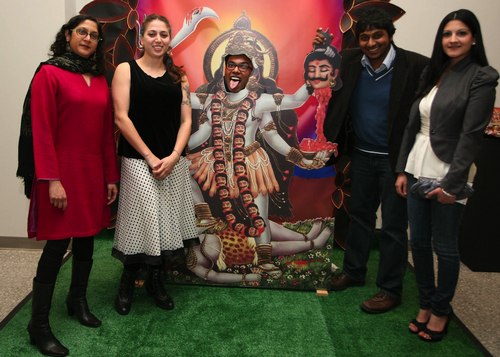 KALI painting and Artists of IAAC exhibit:
Nidhi Jalan, Asha Ganpat, Satyakam Saha, Raghava KK & Sonia Chaudhary
Courtesy MasalaJunction.com & IAAC Photo © & courtesy of Gunesh Desai |
|
 Ramya Ramnarayan in JAVALI
Courtesy MasalaJunction.com & IAAC Photo © & courtesy of Gunesh Desai |
|
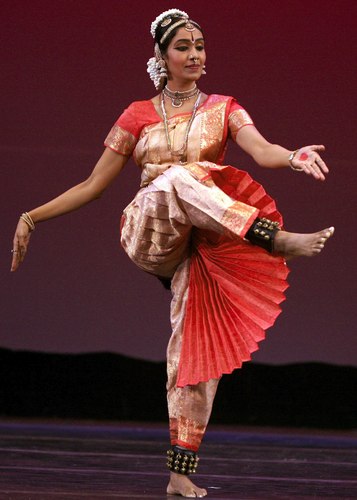 Ramya Ramnarayan in THILLANA
Courtesy MasalaJunction.com & IAAC Photo © & courtesy of Gunesh Desai |
|
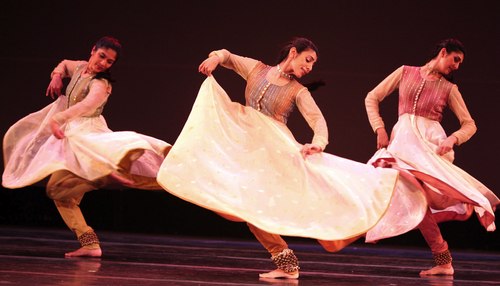 Parul Shah Dance Co in SAMANVAY
Courtesy MasalaJunction.com & IAAC Photo © & courtesy of Gunesh Desai |
|
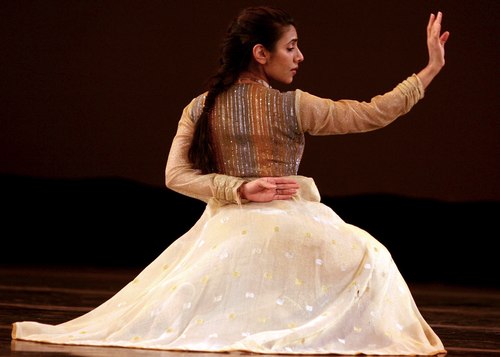 Parul Shah in SAMANVAY
Courtesy MasalaJunction.com & IAAC Photo © & courtesy of Gunesh Desai |
|
 Parijat Desai Dance Co. in QUIET/FIRE
Courtesy MasalaJunction.com & IAAC Photo © & courtesy of Gunesh Desai |
|
 Maria Colaco held high in …TWO, THREE, FOUR
Courtesy MasalaJunction.com & IAAC Photo © & courtesy of Gunesh Desai |
|
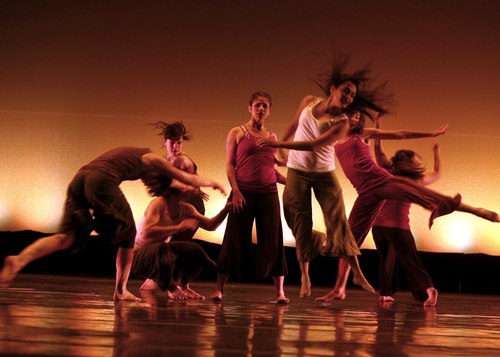 Maria Colaco Dance in …TWO, THREE, FOUR
Courtesy MasalaJunction.com & IAAC Photo © & courtesy of Gunesh Desai |
|
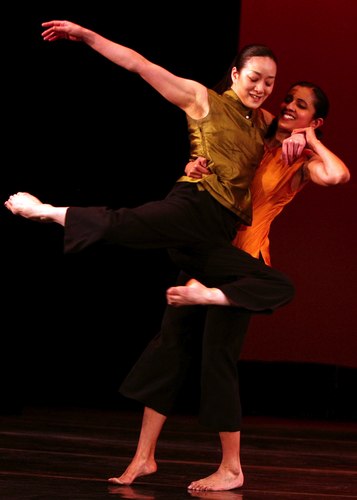 Riyo Mito & Parijat Desai in REWIRED
Courtesy MasalaJunction.com & IAAC Photo © & courtesy of Gunesh Desai |
|
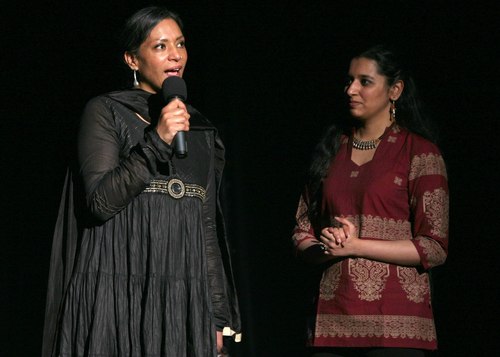 Directors of combined event: Amina Ahmed & Prachi Dalal of IAAC
Courtesy MasalaJunction.com & IAAC Photo © & courtesy of Gunesh Desai |
|
|
|











